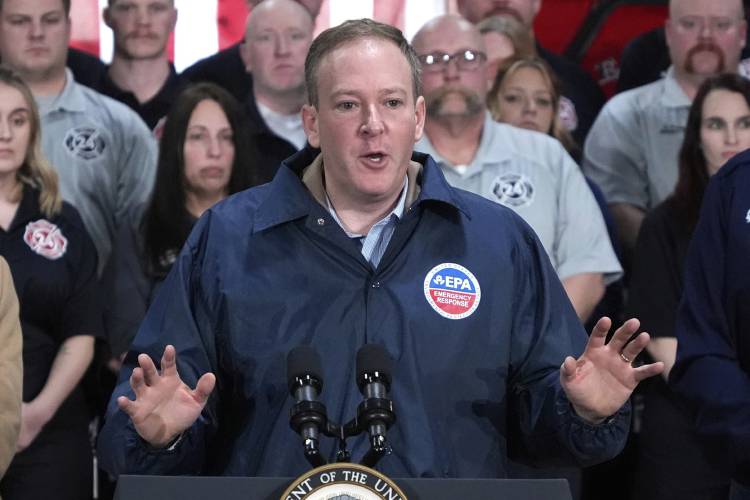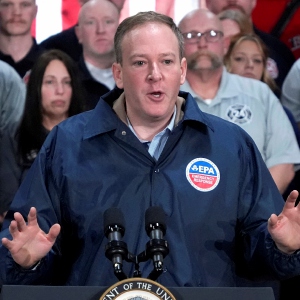
Local climate activists say they are focusing their efforts on state and local initiatives in the wake of the U.S. Environmental Protection Agency’s decision, at the behest of Administrator Lee Zeldin, to eliminate its power to regulate greenhouse gases and pollutants.
AP
SPRINGFIELD — In the wake of the U.S. Environmental Protection Agency’s move to eliminate its power to regulate greenhouse gases and pollutants, western Massachusetts climate action groups are rolling up their sleeves and channeling their frustration into state-level advocacy.
“It just fuels my passion,” said Susan Theberge, co-founder of Climate Action Now Western Massachusetts. “We have to work at the state level and at the municipal level, which is where we have power right now. We are holding the line.”
On Tuesday, the EPA published a proposal that revokes the “endangerment finding,” a 2009 decision that defined carbon dioxide and other greenhouse gases as harmful to human health. The 16-year-old determination officially classified these gases as air pollution that the agency could regulate under the Clean Air Act. Now, the agency walked back its definition, claiming that air pollution is best defined as “local or regional exposure to dangerous air pollution.”
“It’s really a criminal act in the big picture,” said Andra Rose, president of Local Energy Advocates of Western Mass. “The endangerment finding has been the basis for our work at the federal level, and limiting pollution and climate emissions. It discourages being able to do anything at the federal level.”
Local activists like Theberge interpret the proposal as “gaslighting” their daily experiences with climate change and as part of the Trump administration’s attempts to deny global warming. With the federal government’s stance on climate action clearly communicated, they’re setting their sights on advocating for state climate legislation and combating new fossil fuel projects in Springfield.
“For them to be making these decisions right now when we are in the middle of the heat wave and we see huge amounts of smoke wafting from wildfires in the north, when many people are feeling the climate changes in their homes, when people who have asthma have to go to the hospital emergency room, when people with chronic illness like myself are having complications due to the heat, it’s an insult to us and to humanity itself,” said Naia Tenerowicz, lead organizer of the Springfield Climate Justice Coalition.
The EPA proposal also claims that even if the agency could regulate these emissions, greenhouse gases do not have as large an impact on climate change or human health as previously believed. The statement is based on a non peer-reviewed study published by the Department of Energy’s 2025 Climate Working Group, which finds that U.S. policy has relatively small impacts on combating climate change.
In mid-March, EPA rolled back 31 environmental rules that preserve air and water quality and reduce emissions in what Administrator Lee Zeldin called the “greatest day of deregulation in our nation.” Zeldin wrote that he drove “a dagger straight into the heart of the climate change religion” by weakening regulations on power plants, fossil fuel companies and automobiles.
“I’m appalled, but not surprised, that the Environmental Protection Agency is now declaring that it’s not going to protect the environment,” Greening Greenfield leader Peg Hall said. “Greening Greenfield and other such entities are working on making sure that locally — whether that be Greenfield or Massachusetts — we continue to make progress wherever we can, which is a little more under our control.”
An Associated Press examination, which also used data from the EPA itself, found the rollback of these rules would come with a high cost. These regulations, including setting limits for air pollutants, would have saved at least $275 billion a year and more than 30,000 lives annually in the U.S. At least 10,000 of those deaths were related to air pollution and toxic particulate matter such as lead and mercury.
Springfield, the city with the fourth-highest asthma rates in the country, knows that state climate policy can improve quality of life for residents. In an effort to prevent further smog and smoke in the city, the Springfield Climate Justice Coalition is fighting two projects that would expand greenhouse gas emissions in the city: a wood-burning power plant that will burn up to 1,200 tons of wood a day, and an Eversource natural gas pipeline that extends from Longmeadow into Springfield.
Tenerowicz and Rose said they decided to focus on these two projects because the permitting and approvals are at the state and local levels. The elimination of the endangerment finding sent Tenerowicz a clear message that the federal government is “writing off people’s lives as acceptable sacrifice for the economy,” but she said Gov. Maura Healey’s administration continues to move forward with the green transition.
“Right now, we have to do everything we possibly can, and even more than we think we can do, at the municipal and state levels to move swiftly and rapidly to a just energy transition,” Theberge said.
Just before an Eversource open house and listening session on Aug. 7, Climate Action Now Western Massachusetts and the Springfield Climate Justice Coalition will hold a demonstration and letter-writing campaign at 5:15 p.m. in Stearns Square. The organizations are also focusing on state bills H.3547/S.2290 to block further large-scale natural gas infrastructure in environmental justice areas and accelerate the transition to clean, non-combusting heating systems.
In a column in the Daily Hampshire Gazette last week, Darcy Dumont, a former Amherst town councilor and sponsor of legislation creating the town’s Energy and Climate Action Committee, urges residents to support two other pieces of climate action legislation. The Climate Bank Bill would establish an independent bank that finances decarbonization efforts, renewable energy infrastructure and green manufacturing development. The Make Polluters Pay Bill would fine fossil fuel companies for the environmental and health impacts of emissions and leverage the funds into climate adaptation and mitigation projects.
“The one thing that we have on our side is the enormous power of people coming together. This country cannot operate unless we are all cooperative with it,” Theberge said. “The escalation of the climate disaster should give us more energy and passion to stand together. Life on this planet is at stake.”
Emilee Klein can be reached at eklein@gazettenet.com.
